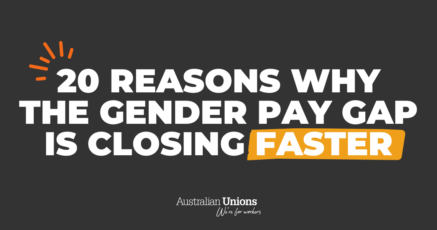18-year-old Alison Pennington was sacked from her job in a shoe store because she asked if her hourly pay rate was the same as a co-worker’s.
Now as Senior Economist at The Australia Institute’s Centre of Future Work, Pennington is arguing for the end of pay secrecy clauses.
“What’s attached to pay secrecy is shame. The shame of disclosing the value of what’s been given to you by someone with far more power than you,” she says.
“It is absolutely everything about women’s economic security because those with the power to determine the value of women’s work are disproportionately men.”
Pay secrecy contributes to the gender pay gap
The Gender pay gap number is often given as 13.8% but this figure only accounts for full time ordinary earnings. When bonuses are considered in addition to full time ordinary earnings that figure becomes 16.4%.
And if we recognise that 45% of women are in part-time jobs, working women experience a pay gap with men of almost 31%.
Employer policies or contracts that prevent workers from discussing their pay with their workmates means that challenges to the gender gap are silenced in many Australian workplaces.
Pennington says that this unfair treatment of women in the workplace reflects how women are treated in broader Australian society.
What pay secrecy clauses try to do is press the ‘mute button’ on that structural discrimination.
It prevents the information being gathered that is necessary to effectively bargain and put forward the case for your skills and your capacities.
Alison Pennington
Senior Economist, Centre for Future Work

Gag clauses on discussing pay are “a tool of control” for employers according to Pennington, saying it “brews cultures of fear and silence.”
The Finance Sector Union campaign to remove gag clauses
At 29%, the gender pay gap in the finance industry is one of the worst in Australia.
Finance Sector Union National Secretary Julia Angrisano says the finance industry taking out the “top prize” in the gender pay gap is “not the prize you want”.
The union’s campaign to end pay secrecy has already seen three of the big four banks come out to say they won’t enforce gag clauses.
“But we want them gone forever,” Angrisano says.
“Having them there, that in itself perpetuates a culture that you really shouldn’t talk about these things.”
The Commonwealth Bank of Australia (CBA) was one of the big four banks to recently announce the end of pay secrecy after immense pressure from the Finance Sector Union.
CBA fired a staff member in 2021 after having discussed pay with their workers and a follow-up report from the FSU found most CBA workers believed they weren’t allowed to discuss pay and doing so would risk disciplinary action.
The report found that this fear of repercussions was a key driver of the gender pay gap in a workplace where more than half of the workers were women.
After the wins at the big banks, Angrisano is now turning her attention towards the Federal Government.
“It’s really time for the Federal Government to take action to outlaw confidentiality clauses,” she says.
“The Morrison Government knows there’s a problem – they just refuse to do anything about it. They can and they should have outlawed these clauses, but they’ve chosen not to.”
Women workers stronger with collective bargaining
Pennington explains that pay secrecy can only be maintained through individual contracts. For women to be paid fairly, collective bargaining will always be in their best interest.
Joining a union is the most effective way to ensure your workplace is a place where those conversations between workmates can occur.
Union members earn, on average, $312 more per week than non-union members.
With women making up the majority of union members, there’s no better time to join your union.







SHARE:
Why pay secrecy clauses are sexist